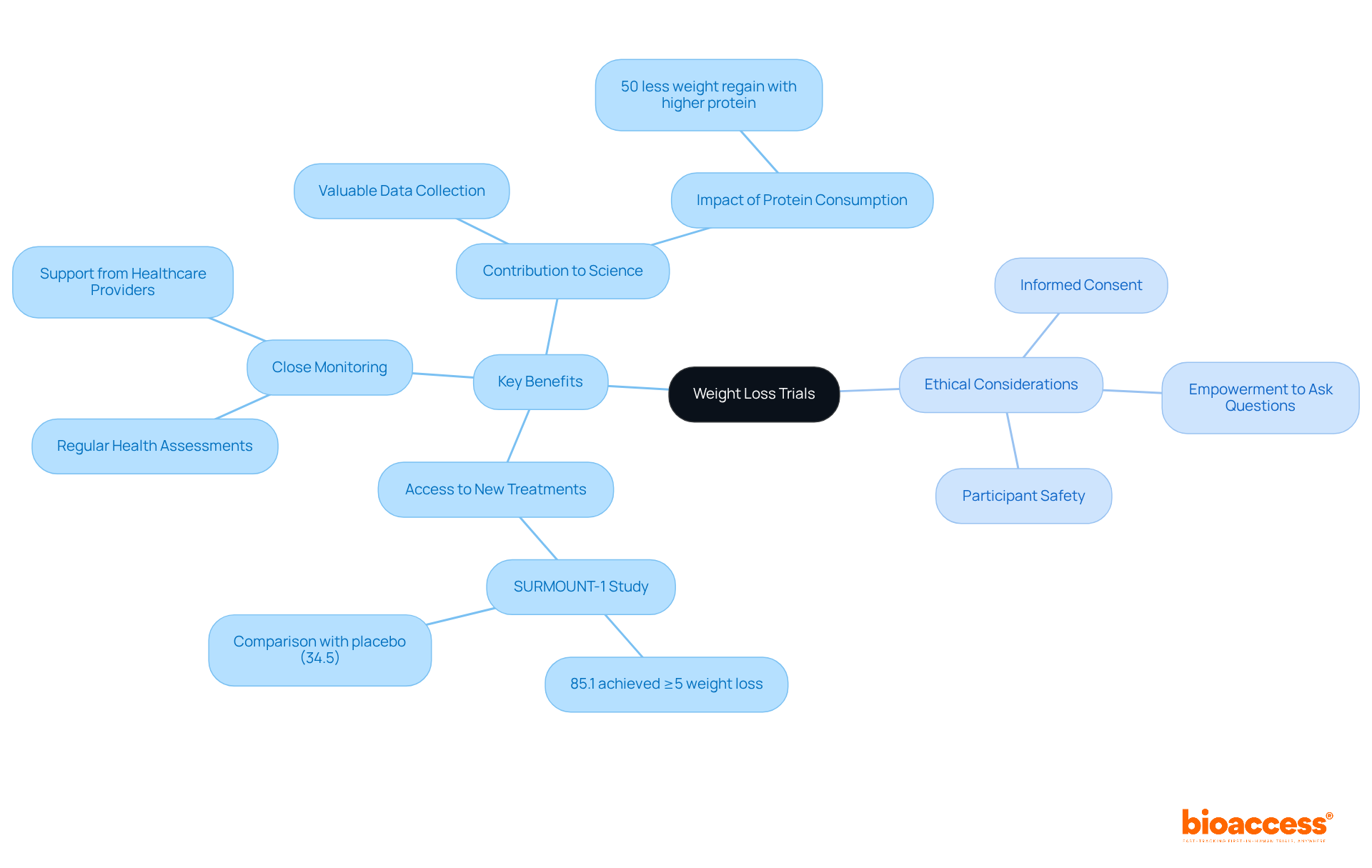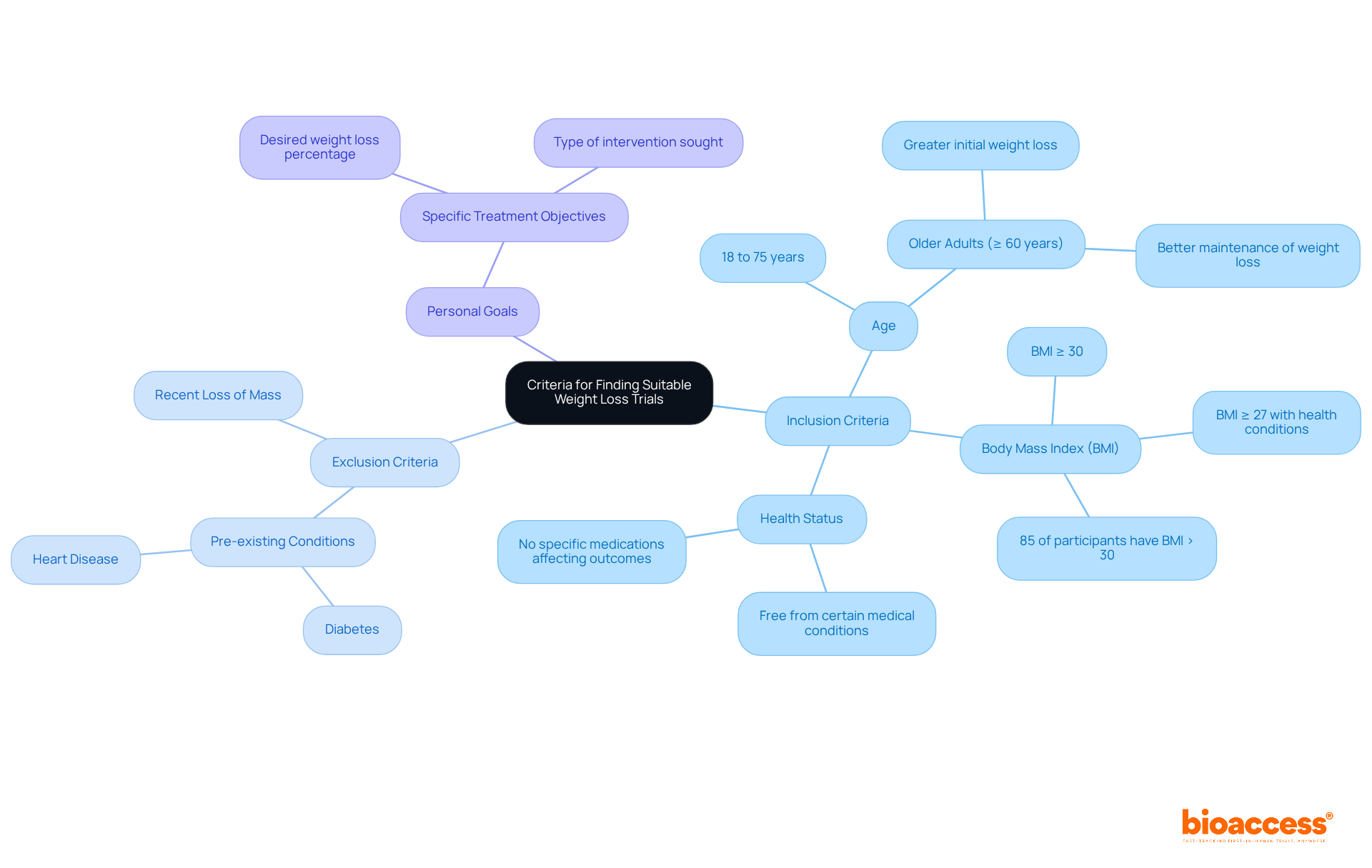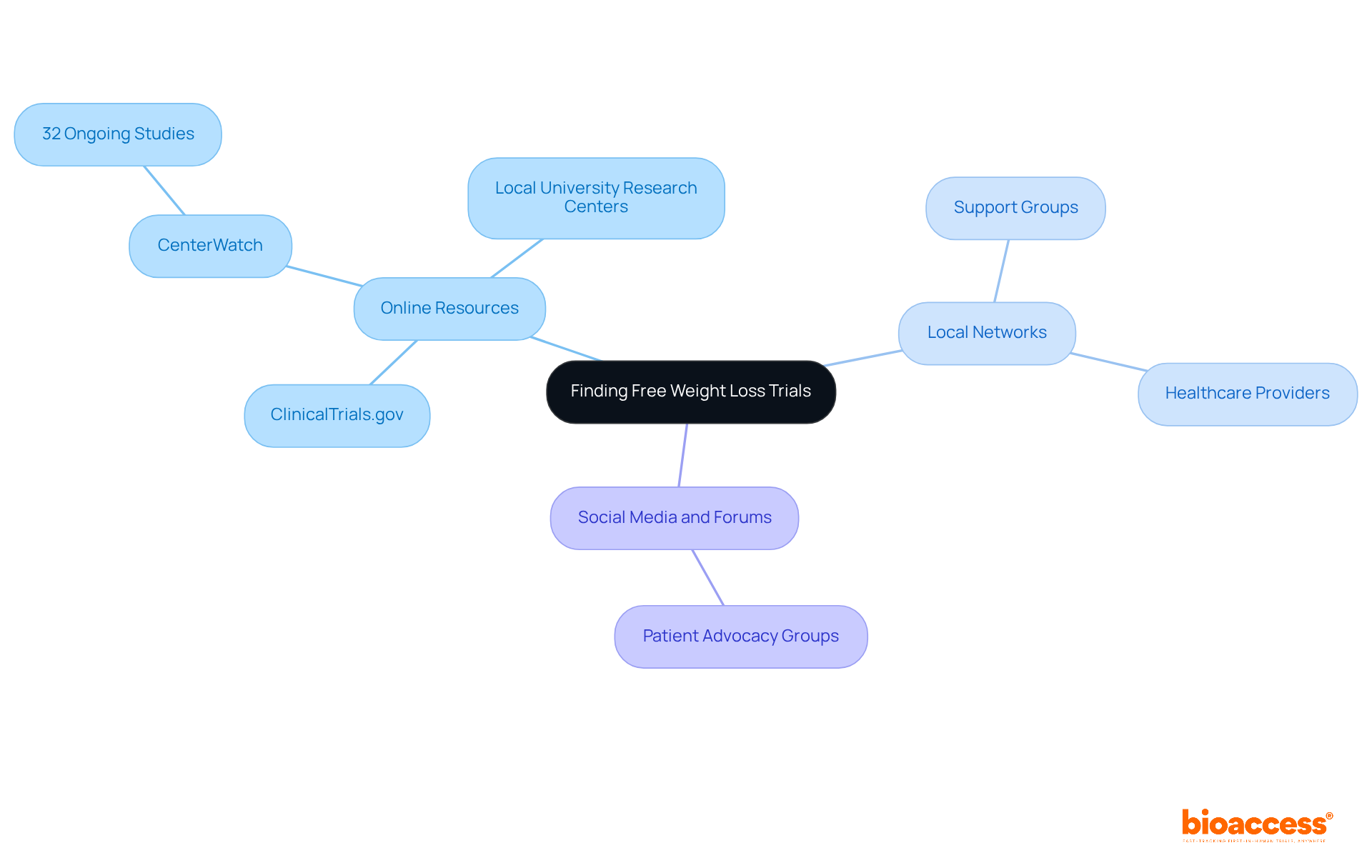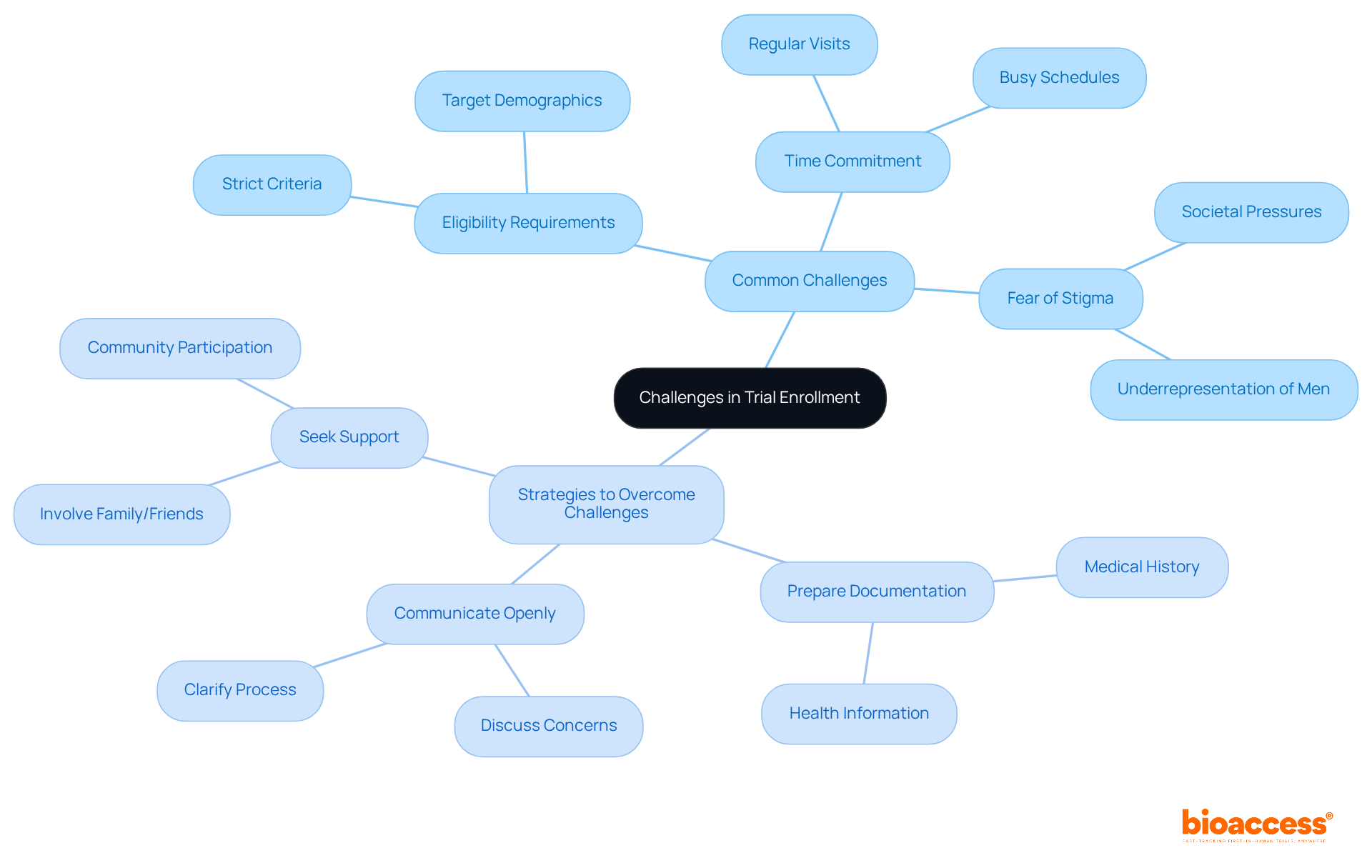Overview
The article outlines four essential steps to locate free weight loss trials, underscoring the significance of:
- Understanding eligibility criteria
- Utilizing online resources
- Leveraging local networks
These steps are bolstered by detailed explanations of the benefits of participation, which include:
- Access to new treatments
- Contributions to scientific research
Furthermore, practical strategies are provided to navigate the challenges associated with trial enrollment, ensuring that potential participants are well-informed and prepared. By engaging with this information, readers can better appreciate the value of participating in clinical trials and the impact it has on advancing medical knowledge.
Introduction
Finding effective solutions for weight loss can often feel overwhelming, particularly given the plethora of options available. However, free weight loss trials present a unique opportunity for individuals seeking not only to shed pounds but also to contribute to groundbreaking research. By participating in these trials, individuals can access innovative treatments, receive personalized healthcare support, and play a vital role in advancing obesity management strategies. Yet, with strict eligibility criteria and potential challenges in enrollment, one must consider how to navigate this complex landscape to find the right trial.
Understand Weight Loss Trials and Their Importance
Weight reduction studies, such as free weight loss trials near me, serve as crucial clinical investigations designed to evaluate innovative therapies, medications, or interventions aimed at assisting individuals in shedding excess weight. These experiments are vital for advancing medical knowledge and developing effective management strategies for body mass. By participating, individuals not only contribute to scientific research but may also gain access to cutting-edge treatments that are not yet available to the general public. Understanding the purpose and potential advantages of free weight loss trials near me can motivate individuals to seriously consider participation.
Key Benefits of Participating in Weight Loss Trials:
- Access to New Treatments: Participants may receive new medications or therapies that could prove more effective than existing options. For instance, in the SURMOUNT-1 study, 85.1% of individuals on Zepbound 5 mg achieved clinically significant weight loss of ≥5%, compared to just 34.5% in the placebo group, underscoring the potential of new therapies.
- Close Monitoring: Participants typically undergo regular health assessments and receive support from healthcare providers, ensuring their well-being throughout the study. This close monitoring can lead to improved health outcomes and personalized care through free weight loss trials near me.
- Contribution to Science: By participating in free weight loss trials near me, individuals contribute to researchers gathering valuable data that can lead to breakthroughs in obesity treatment. Research has shown that increased protein consumption significantly aids in weight management, with individuals consuming more protein regaining 50% less weight compared to those on a placebo.
Ethical Considerations:
It is essential to recognize that all trials are conducted under stringent ethical guidelines to guarantee participant safety and informed consent. Participants should feel empowered to ask questions and fully understand their rights before enrolling in any study. The importance of informed consent is highlighted by conclusions drawn from workshops, emphasizing that a well-structured randomized clinical study is critical for developing effective clinical and public health policies related to obesity treatment. Participation in these experiments not only supports individual health goals but also enhances the overall understanding of effective management techniques.

Identify Criteria for Finding Suitable Trials
When seeking suitable programs for weight reduction, recognizing specific standards is essential for narrowing down options for free weight loss trials near me. Key factors to consider include:
Inclusion Criteria:
- Age: Most trials typically require participants to be between 18 and 75 years old, ensuring a diverse age range while focusing on adult populations. Significantly, older individuals (≥ 60 years) experienced greater initial loss and maintained this reduction more effectively than younger individuals.
- Body Mass Index (BMI): Many studies mandate a BMI of 30 or higher, or 27 with related health conditions, reflecting the clinical focus on obesity and its associated risks. More than 85% of individuals in obesity studies have a BMI exceeding 30 kg/m², emphasizing the importance of this metric. Furthermore, at least 35% of participants in investigational therapy groups should lose 5% or more of their baseline body mass to consider the therapy effective.
- Health Status: Participants may need to be free from certain medical conditions or currently taking specific medications, as these factors can influence treatment outcomes and safety.
Exclusion Criteria:
- Pre-existing Conditions: Some trials may exclude individuals with conditions such as diabetes or heart disease, as these can complicate the assessment of weight loss interventions.
- Recent Loss of Mass: Participants who have shed a significant amount of mass recently may not qualify, as recent changes can influence the stability of results.
Personal Goals and Preferences:
Consider what you hope to achieve through participation. Are you seeking a specific type of treatment or intervention? Understanding your personal objectives can assist you in discovering free weight loss trials near me that meet your needs. This alignment is crucial, as studies indicate that the annual chance of attaining a 5% reduction in mass is 1 in 8 for men and 1 in 7 for women with morbid obesity. By clarifying your goals, you can better navigate the choices available in the evolving landscape of clinical studies regarding weight loss.

Utilize Online Resources and Local Networks
Locating free weight loss trials near me can be simplified by utilizing a mix of internet resources and community connections. This guide outlines effective strategies to enhance your search for relevant clinical trials.
Online Resources:
- ClinicalTrials.gov: This extensive database enables users to search for clinical trials based on location, condition, and eligibility criteria. By refining results, you can easily find free weight loss trials near me that focus on slimming.
- CenterWatch: This platform catalogs current clinical studies and offers comprehensive details about the research procedure, including enrollment criteria and study goals. At present, there are 32 ongoing clinical studies looking for participants for research on reducing body mass.
- Local University Research Centers: Numerous universities carry out clinical studies and frequently publish listings on their websites. Exploring local institutions can uncover relevant studies that may not be widely advertised.
Local Networks:
- Support Groups: Engaging with local weight loss or health support groups can lead to valuable insights about ongoing trials. Members often share their experiences and knowledge of available studies, creating a supportive community. As Patricio Ledesma notes, "By leveraging the expertise and infrastructure of multiple experienced sites within a single network, sponsors and CROs can access a larger pool of qualified investigators, reduce costs, streamline operations, and enhance patient recruitment and retention."
- Healthcare Providers: Consulting with your doctor or healthcare provider can be advantageous, as they may have information about free weight loss trials near me or connections to specialists engaged in clinical research.
Participating in online forums or social media groups dedicated to weight loss can also provide useful information about trials. These platforms enable former attendees to share their experiences, providing insights that can influence your decision-making. The existence of engaged patient advocacy groups can greatly impact participant interactions during clinical studies, emphasizing the significance of these networks in recruitment initiatives.

Navigate Challenges in Trial Enrollment
Participating in a weight loss study can present various challenges. Understanding these obstacles is crucial for potential participants.
Common Challenges:
- Eligibility Requirements: Many trials impose strict criteria that can be difficult to meet. For instance, studies often target specific demographics, such as men with a BMI between 25 and 40, which can limit participation. Understanding these requirements in advance can save time and effort.
- Time Commitment: Trials frequently necessitate regular visits and participation in assessments, which can be challenging for those with busy schedules. For example, the Gutbusters program required participants to attend weekly sessions for the first 12 weeks, which may deter those with limited availability.
- Fear of Stigma: Some individuals may feel embarrassed about participating in weight loss studies due to societal stigma surrounding obesity. This concern can hinder enrollment, particularly among men, who are often underrepresented in such studies.
Strategies to Overcome Challenges:
- Prepare Documentation: Have your medical history and any relevant health information ready to streamline the enrollment process. This preparation can help you meet eligibility requirements more efficiently.
- Communicate Openly: Discuss any concerns with the study coordinators. They can provide clarity on the process and address any fears. Open communication can also assist in customizing the experience to better meet your needs.
- Seek Support: Involve family or friends in your decision-making process. Their support can help alleviate anxiety and encourage participation. Involving loved ones can also improve dedication to the study, as demonstrated in effective recruitment strategies that highlight community participation.
Follow-Up:
After expressing interest in a trial, ensure to follow up with the coordinators to stay informed about your application status and any next steps. This proactive approach can enhance your chances of successful enrollment and participation.
Additional Insights:
- Statistics on Dropout Rates: It's important to note that dropout rates in similar weight loss trials can be as high as one-third to one-half, underscoring the challenges faced in enrollment.
- Retention Rate Data: The Gutbusters program achieved a high retention rate of 73.5%, indicating that once men are enrolled, they tend to stay engaged, which is a positive counterpoint to the challenges discussed.
- Case Studies: The effectiveness of the newspaper advertisement campaign in recruiting participants highlights the importance of tailored recruitment strategies. Additionally, challenges faced in recruiting men with lower educational backgrounds emphasize the need for targeted approaches.
- Expert Quotes: Insights from experts like Tiffany Rounds underscore the barriers to male participation and the necessity of effective recruitment techniques to engage this demographic.

Conclusion
Participating in free weight loss trials presents a unique opportunity for individuals to access innovative treatments while contributing to vital research aimed at combating obesity. These trials not only offer potential health benefits but also play an essential role in advancing medical understanding and developing effective weight management strategies. Recognizing the significance of these studies can inspire individuals to explore their options and consider participation as a proactive step toward their health goals.
The article outlines several critical aspects of finding and participating in weight loss trials. Key benefits include:
- Access to new therapies
- Close health monitoring
- The chance to contribute to scientific knowledge
It emphasizes the importance of understanding eligibility criteria, utilizing online resources, and leveraging local networks to locate suitable trials. Moreover, addressing common challenges such as eligibility requirements and time commitments is crucial for prospective participants.
Ultimately, engaging in weight loss trials transcends personal journeys; it embodies a collective effort that can lead to significant advancements in obesity treatment. By taking the initiative to seek out these opportunities, individuals can not only work toward their weight loss goals but also play a pivotal role in shaping future health solutions. Embracing this path can yield transformative results, both personally and for the broader community.
Frequently Asked Questions
What are weight loss trials?
Weight loss trials are clinical investigations designed to evaluate new therapies, medications, or interventions aimed at helping individuals lose excess weight.
Why are weight loss trials important?
They are crucial for advancing medical knowledge and developing effective management strategies for body mass, while also providing participants with access to cutting-edge treatments not yet available to the general public.
What are the key benefits of participating in weight loss trials?
Key benefits include access to new treatments, close monitoring by healthcare providers, and the opportunity to contribute to scientific research that can lead to breakthroughs in obesity treatment.
How effective are new treatments in weight loss trials?
For example, in the SURMOUNT-1 study, 85.1% of individuals on Zepbound 5 mg achieved clinically significant weight loss of ≥5%, compared to just 34.5% in the placebo group, highlighting the potential effectiveness of new therapies.
What kind of support do participants receive during weight loss trials?
Participants typically undergo regular health assessments and receive support from healthcare providers, ensuring their well-being throughout the study.
How does participation in weight loss trials contribute to science?
Participants help researchers gather valuable data that can lead to advancements in obesity treatment, such as findings that increased protein consumption aids in weight management.
Are weight loss trials conducted ethically?
Yes, all trials are conducted under stringent ethical guidelines to ensure participant safety and informed consent. Participants should feel empowered to ask questions and understand their rights before enrolling.
What is the significance of informed consent in weight loss trials?
Informed consent is crucial as it ensures that participants are fully aware of their rights and the nature of the study, which is essential for developing effective clinical and public health policies related to obesity treatment.
List of Sources
- Understand Weight Loss Trials and Their Importance
- Report of a National Institutes of Health–Centers for Disease Control and Prevention workshop on the feasibility of conducting a randomized clinical trial to estimate the long-term health effects of intentional weight loss in obese persons (https://sciencedirect.com/science/article/pii/S0002916522042885)
- Efficacy of a Commercial Weight Management Program Compared With a Do-It-Yourself Approach (https://jamanetwork.com/journals/jamanetworkopen/fullarticle/2795182)
- Randomized Clinical Trials of Weight-Loss Maintenance: A Review - PMC (https://pmc.ncbi.nlm.nih.gov/articles/PMC2676575)
- Clinical Data, Safety & Study Design | WR | Zepbound® (tirzepatide) (https://zepbound.lilly.com/hcp/clinical-data-weight)
- Sample Size in Obesity Trials: Patient Perspective vs Current Practice - PMC (https://pmc.ncbi.nlm.nih.gov/articles/PMC2914621)
- Identify Criteria for Finding Suitable Trials
- Clinical Data Mega-Collection of Obesity and Obesity-Related Trials: Primary Inclusion Criteria from All Studies and Highlights of Clinical Efficacy Analysis of GLP-1 Drugs (https://mdpi.com/2077-0383/14/3/812)
- Long-term weight loss effects of semaglutide in obesity without diabetes in the SELECT trial - Nature Medicine (https://nature.com/articles/s41591-024-02996-7)
- Greater Weight Loss with Increasing Age in the Weight Loss Maintenance Trial - PMC (https://pmc.ncbi.nlm.nih.gov/articles/PMC3849225)
- Probability of an Obese Person Attaining Normal Body Weight: Cohort Study Using Electronic Health Records - PMC (https://pmc.ncbi.nlm.nih.gov/articles/PMC4539812)
- Utilize Online Resources and Local Networks
- Clinical Trials in Nutrition and Weight Loss | CenterWatch (https://centerwatch.com/clinical-trials/listings/therapeutic-area/27/nutrition-and-weight-loss)
- How Clinical Site Networks Enhance Clinical Trials (https://sofpromed.com/how-clinical-site-networks-enhance-clinical-trials)
- Weight Loss Clinical Trials & Research Studies Near You (Updated 8/25) (https://policylab.us/clinical-trials/l/conditions/weight-loss)
- Clinical Trials and Social Media: Friends or Foes? | WCG (https://wcgclinical.com/insights/clinical-trials-and-social-media-friends-or-foes)
- Navigate Challenges in Trial Enrollment
- Patient Recruitment in Clinical Trials Areas of Challenges and Success, a Practical Aspect at the Private Research Site (https://scirp.org/journal/paperinformation?paperid=128354)
- Enrollment Challenges: Recruiting Men to Weight Loss Interventions - PMC (https://pmc.ncbi.nlm.nih.gov/articles/PMC6440040)
- Enrollment and Retention: A Strategic Imperative for Clinical Trial Success - ConfidenceResearch (https://confidenceresearch.com/enrollment-and-retention-a-strategic-imperative-for-clinical-trial-success)
- Enrollment in Clinical Trials: Statistics and Patient Recruitment Strategies (https://withpower.com/guides/enrollment-in-clinical-trials-statistics-and-patient-recruitment-strategies)
- Mastering Patient Recruitment in Clinical Trials (https://clinicalleader.com/topic/patient-recruitment-and-enrollment)






